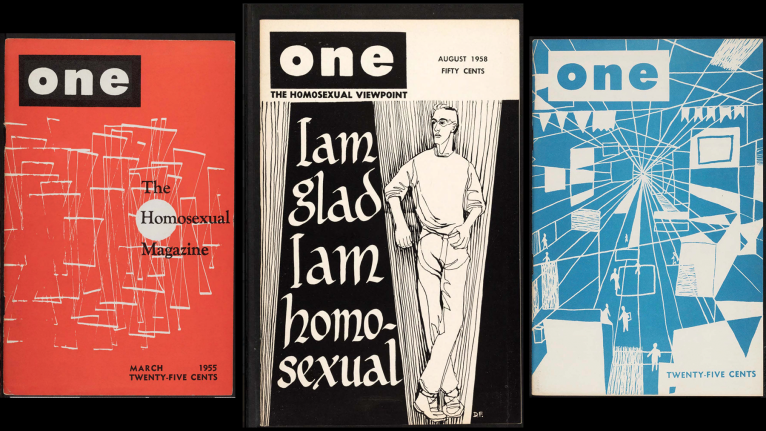
ONE Magazine at Seventy commemorates ONE’s legacy of uplifting LGBTQ+ communities and advancing queer rights and visibility through print. This exhibition chronicles the history of ONE Magazine, from its inaugural issue in January 1953 through its continued publishing until December 1967. The show examines themes that ONE tackled that remain pertinent today, including the fight against anti-gay police and state violence, the importance of building community and cultivating joy, and the protection of free speech. This exhibition considers the production and distribution of the magazine, the makers of the magazine (many of whom used pseudonyms), and the precedent it set for subsequent gay and lesbian periodicals and community formation. A selection of covers and inside spreads from ONE Magazine, supporting archival documents, audio stories, and ephemera will be on view at the Center’s gallery.
Exhibition materials will highlight iconic artifacts from ONE Magazine’s history such as the October 1954 issue that became the focal point of the landmark Supreme Court case ONE, Inc. v. Olesen, which was the first in U.S. history to rule in favor of LGBTQ+ freedom of speech and expression. Print blocks from the magazine’s production, early homophile posters, and letters to ONE will also be on view. Alongside public programming in the space, these materials will showcase key moments of ONE’s history, activism, and contribution to queer liberation.
ONE Magazine at Seventy will be on view at the Los Angeles LGBT Center’s Advocate & Gochis Galleries from October 1–November 5, 2023, Friday-Sunday 12-5 PM.
The opening reception for this exhibition will take place on October 1, 2023, 3:00-6:00 PM at the Center’s gallery and courtyards, 1125 N McCadden Pl, Los Angeles, CA 90028.
ONE Magazine at Seventy is organized by One Institute and co-presented with the Los Angeles LGBT Center as part of Circa 2023. The exhibition is curated by ONE Archives at the USC Libraries curator Alexis Bard Johnson, curatorial assistant Quetzal Arévalo, research assistant Sela Kerr, and assistant Bryce Zeffert.